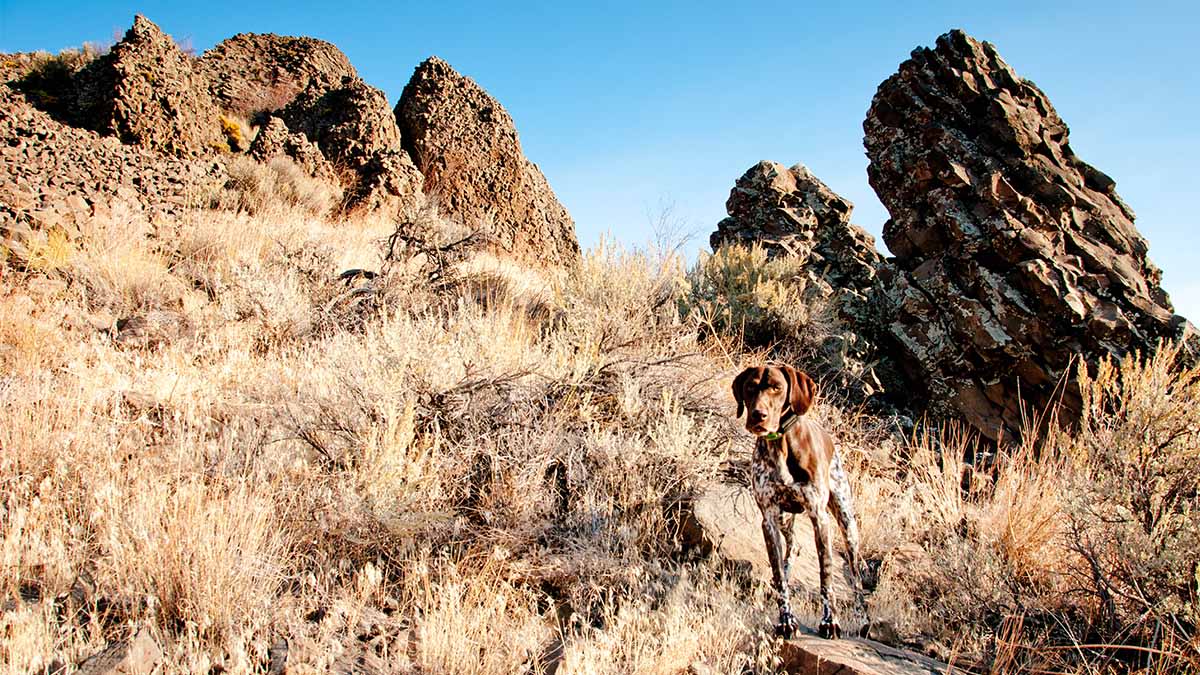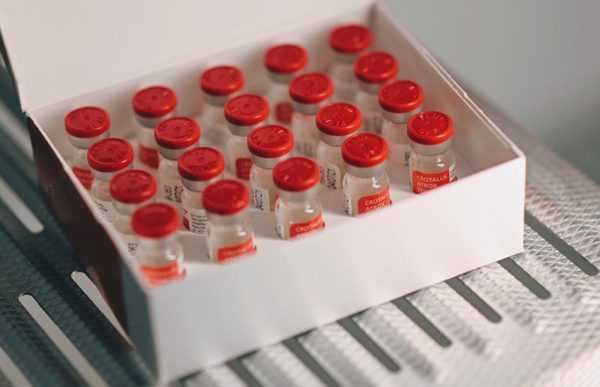
Training and fieldwork create a special bond between dog and owner. But our four-legged friends often find themselves in situations where they need our help. Our new Ask a Vet series delivers advice directly from a professional, working veterinarian. Have a question about your dog? Shoot an email to themeateater@themeateater.com and we’ll dig into the concern.
“I know a lot of guys that don’t take their dog out in the early season due to rattlesnakes. I also know a few who do. The ones that roll the dice note that they use a rattlesnake vaccine from their vet. But I’ve also heard mixed stories on the effectiveness of the vaccine. Can you provide some clarity?” -Morgan Mason
Should the vaccine be part of your hunting companion’s immunization schedule? The answer you receive depends on which veterinarian you ask. The published research as to its efficiency remains murky at best, with most vets basing their recommendations on their own anecdotal experience due to the lack of compelling science. If you’ll pardon the pun, there’s also a lot of buzz about the rattlesnake vaccine among bird dog owners, who tend to label it somewhere between impenetrable armor and worthless placebo.
Technically, the vaccine is a Crotalus atrox toxoid, which is specific for the venom of a western diamondback rattlesnake only. The vaccine is comprised of a compound similar in structure to the actual toxin found in venom, but chemically modified to avoid causing disease. Theoretically, the toxoid stimulates the bird dog’s immune system to create antibodies against the actual toxin, and in the event of a bite, helps prevent a severe reaction.
Most dog owners are familiar with antivenom, which is administered to canines to reduce the severity of the toxin after a bite. The vaccine is a preemptive measure applied before a bite and boostered annually; the antivenom is used after a life-threatening bite occurs.
Antivenom is wallet-busting expensive and used during treatment of severe snakebites. The vaccine is a fraction of that price and designed to minimize the severity of a bite. But the vaccine itself is not entirely benign. About 5% or more of the dogs we vaccinate experience a localized reaction, ranging from mild sensitivity at the injection site to a sterile abscess that requires drains.
From my own interviews with colleagues around the country, I’ve surmised that veterinarians align with one of three general groups: those that believe the vaccine provides some level of protection, those that believe the vaccine offers no medical benefit, and those that believe the vaccine does more harm than good. The latter group believes the risk of a potentially severe reaction to the vaccine outweighs any perceived benefit it provides.
In practice, I tend to lean towards recommending the vaccine annually for high-risk patients. Bird dogs who spend time hunting in snake habitat are definitely on that list. It has been my experience, as well as the other veterinarians in my practice, that vaccinated dogs tend to have less severe reactions overall, which equates to less time in the hospital and a smaller veterinary bill.
I tell clients that the vaccine may save the life of a dog that would have had an immediate anaphylactic reaction, by buying you some time to get to a veterinarian. Symptoms could include severe facial or limb swelling, a sudden drop in heart rate, or respiratory distress. For the bird dog that would have experienced a moderate reaction with pain and swelling at the bite site, the vaccine may help downgrade it to a minor one that can be treated with moderate doses of anti-inflammatories and antibiotics alone. In all of these cases, you should bring in your dog for evaluation.
Even if the reaction doesn’t seem severe, the onset of anaphylaxis can be delayed, especially in vaccinated dogs.
As added insurance, I strongly recommend carrying Benadryl (diphenhydramine, 25 mg) with you in snake country. Give it orally at a dose of roughly 1 milligram per pound of body weight to help prevent or delay a severe allergic reaction.
Of course, the problem with gauging how well the vaccine works centers around a large number of variables involved in each snake encounter. The species of snake, the amount of venom delivered (dry bite vs. wet bite), the location of the bite on the dog, and the individual dog’s immune system, making each case unique.
Even though I recommend the vaccine regularly, I’ll freely admit that I don’t vaccinate my two German shorthairs. I abstain because I feel that my dogs’ risk is minimal. We stay out of snake country in the early season, mostly because I no longer enjoy the paranoia of listening for rattles and worrying about my dogs exploring the brush for birds.
I rely on avoidance rather than immunization to reduce my risk of a deadly encounter by choosing to hunt different types of habitat until cooler weather sets in. You certainly don’t need a medical degree to grasp how keeping your bird dog away from a snake encounter is the only way to truly prevent a potentially deadly and expensive situation.






Conversation